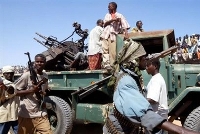Horrible fighting in Somalia
The worst fighting in 15 years in Somalia's capital killed hundreds of people and sent tens of thousands fleeing the battle-scarred city for safety.

As a fragile three-day cease-fire held in the coastal capital, Mogadishu, residents cleared the dusty alleyways and back streets of the unclaimed dead killed during four days of heavy fighting, and loaded them onto trucks for burial at the city's largest cemetery.
"We have seen dozens of Somali bodies in battle fronts," said Hussein Farah Siyad, a member of Mogadishu's dominant and highly influential clan, the Hawiye, who had negotiated a truce with Ethiopian officials.
"We collected and buried them at Barakat cemetery in a one big burial," he said after spending a day on the streets with Ethiopian troops, clearing the dead.
The violence broke out last week when Somali government forces and their Ethiopian backers began an offensive against Islamic insurgents. But civilians bore the brunt of the fighting.
The International Contact Group on Somalia, meeting in Cairo, condemned the fighting Wednesday and demanded that "all parties in Somalia comply with international humanitarian law, guarantee the safety and security for all humanitarian and relief work in Somalia, and ensure the protection of the Somali population."
The contact group is comprised of U.S., European, Arab and African diplomats.
Aid agencies say nearly 400 people were killed and some 565 people wounded when Ethiopian troops used tanks and attack helicopters to crush insurgents. The insurgents are linked to an Islamic movement that had ruled Mogadishu for six months until it was driven out in December.
Somalis poured out of the ruined coastal city on foot and in donkey carts, cars and trucks, joining the exodus of 47,000 people _ mainly women and children _ who have sought safety in the last 10 days, according to the U.N. refugee agency.
Since February, almost 100,000 people have fled the violence. Somalia's transitional government warned of new attacks to crush the insurgents.
Kenya has doubled the number of troops patrolling its 1,500-kilometer (930-mile) border with Somalia to prevent a new influx of refugees, said Antony Kibuchi, the Kenyan police chief in the border province. The Kenyan army is also patrolling in light tanks, he said.
At least 1,300 people who fled Mogadishu arrived at Dobley, a Somali town seven kilometers (four miles) from the Kenyan border. Camps there are dealing with overcrowding, illness and lack of water, aid agencies say.
Somalia's insurgents are linked to the Council of Islamic Courts, which was driven from power in December by Somali and Ethiopian soldiers, accompanied by U.S. special forces. The U.S. has accused the courts of having ties to al-Qaida.
The militants have long rejected any secular government and have sworn to fight until Somalia becomes an Islamic emirate.
The country has been mired in chaos since 1991, when warlords overthrew dictator Mohamed Siad Barre and then turned against each other. A national government was established in 2004, but has failed to assert any real control.
Subscribe to Pravda.Ru Telegram channel, Facebook, RSS!

